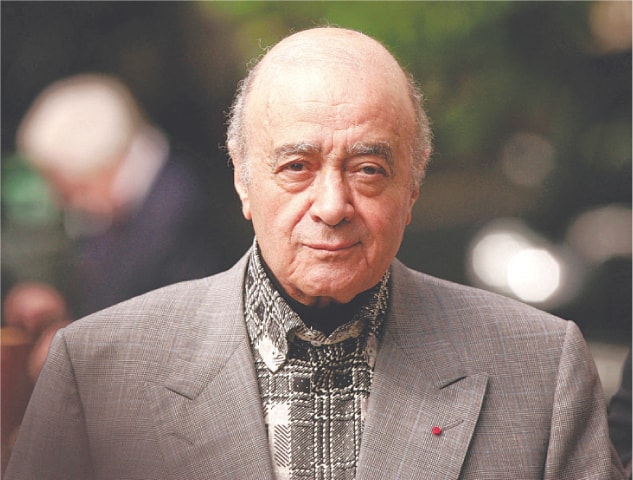
LONDON: Mohamed Al Fayed, the self-made Egyptian billionaire who bought the Harrods department store, was laid to rest next to his son, Dodi, after a funeral held at the central London mosque in Regent’s Park.
Al Fayed, who accused the royal family of being behind the death of his son Dodi and Princess Diana, died at the age of 94.
Born in the Egyptian city of Alexandria, Al Fayed began his career selling drinks and then worked as a sewing-machine salesman. He built his family’s fortune in real estate, shipping and construction, first in the Middle East and then in Europe.
He owned establishment symbols such as Harrods, Fulham and the Ritz hotel in Paris. On social media, Fulham Football Club wrote: “Everyone at Fulham was incredibly saddened to learn of the death of our former Owner and Chairman, Mohamed Al Fayed. We owe Mohamed a debt of gratitude for what he did for our Club, and our thoughts now are with his family and friends at this sombre time.”
Ex-Harrods owner had long accused UK royal family of being behind deaths of his son Dodi and Princess Diana
However, Al Fayed fell out with the British government over its refusal to grant him citizenship of the country that was his home for decades, and often threatened to move to France, which gave him the Legion of Honour, its highest civilian award.
Al Fayed, who could be charming, autocratic, vindictive, and at times wildly outspoken spent 10 years trying to prove Diana and his son Dodi were murdered when their car crashed in a road tunnel in Paris in 1997 as they tried to outrun paparazzi photographers on motorbikes.
Unsupported by any evidence, according to the inquest into Diana’s death, he claimed that she was bearing Dodi’s child and accused Prince Philip, the queen’s husband, of ordering Britain’s security services to kill her to stop her marrying a Muslim and having his baby.
Al Fayed died on Aug 30, his family said, a day before the 26th anniversary of Dodi and Diana’s death.
“Mrs Mohamed Al Fayed, her children and grandchildren wish to confirm that her beloved husband, their father and their grandfather, Mohamed, has passed away peacefully of old age,” the family statement read.
While Al Fayed was known for self-invention, exaggeration, and boasting, he was also a central figure in key moments in Britain’s recent history.
His rancorous takeover of Harrods in 1985 sparked one of Britain’s most bitter business feuds. In 1985 he and his brothers beat businessman Roland “Tiny” Rowland to Harrods, one of the most famous shops in the world. Al Fayed had hoped that buying the store would win him acceptance in British society. Instead, it led to a series of bitter confrontations.
Rowland took Al Fayed and his brothers to a Department of Trade inquiry, claiming that they had misrepresented their wealth. The inquiry cast doubt on their origins as part of a wealthy business family, past business connections, and their independent financial resources.
After a quarter of century of ownership, Al Fayed sold Harrods to Qatar’s sovereign wealth fund in 2010.
His application for British citizenship was denied by the government in 1995. He said racism kept him on the fringe of acceptability. A year earlier, Al Fayed had embarrassed the government by disclosing that he had made gifts and payments to politicians in return for them asking parliamentary questions for him. The so-called “cash-for-questions” scandal ended the careers of four politicians, including one minister. The allegations of sleaze undermined the Conservatives, who lost a landslide election to Labour leader Tony Blair in 1997.
Diana and Dodi
That summer, Al Fayed’s son Dodi began a relationship with Princess Diana, who had divorced Prince Charles, the heir to the British throne. Dodi and Diana were pictured by British tabloids on holiday on a yacht in the south of France.
After travelling to Paris, the couple were killed when their Mercedes, driven at high speed by a chauffeur who had been drinking whisky and was trying to evade the paparazzi, crashed into a concrete pillar in the Pont de l’Alma tunnel.
Beset by grief and an overwhelming sense of injustice, Al Fayed spent millions on legal battles to ensure there was an inquest.
When it started in London a decade after the crash, the jury said the couple were unlawfully killed by their chauffeur’s driving. Al Fayed said he accepted the verdict and gave up legal attempts to show they were murdered.
“I’m leaving the rest for God to get my revenge,” he said.
Published in Dawn, September 3rd, 2023












































Dear visitor, the comments section is undergoing an overhaul and will return soon.